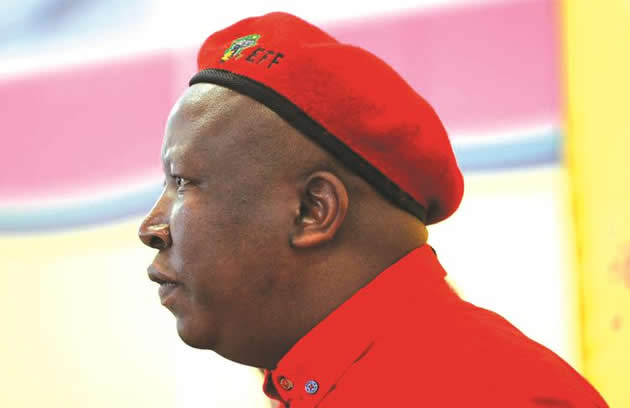
The Sunday Mail

Some in Zanu-PF believe Information, Media and Broadcasting Services Minister Dr Chris Mushohwe should not have responded to South Africa’s Economic Freedom Fighters leader Julius Malema’s unprovoked rants against President Mugabe.
They argue doing so gave credence to a fool’s utterances which craved attention; all to replenish the vessel’s waning political fortunes.
Advocates of this “no-response” disposition view Malema within a single story identity — a narrow aperture that generally depicts the former ANC youth leader as an ignorant rabble–rouser.
Although this stance sums up serious politicians’ estimation of Malema, it glaringly misses the point that over the years, the once firebrand young politician has evolved into something of a split personality leaning more towards the centre-left.
Malema’s drift towards the centre-left makes it simplistic for anyone to dismiss his jibes as the ranting of a dimwit.
A closer analysis of his recent statement proves beyond doubt that he is increasingly finding it difficult to condemn the white capital monopoly he once ascribed as the major stumbling block to real revolutionary transformation.
In short, Dr Mushohwe was not just responding to the Malema who fits the narrow descriptive aperture of rabble-rouser, but also his new-found handlers who use him as an amenable political instrument to derail and reverse the African revolutionary project on resource ownership as personified by President Mugabe.
The EFF leader needed to be cut down to size.
Dr Mushohwe did just that and exposed Malema as a charlatan who has taken South African voters for a ride.
He was on point when he described Malema as a “political charlatan, (who) seems to make up for his inner political deficiencies by projecting himself as a trans-border, continental politician, who fancies big and cute enough to pass comment and judgment on developments elsewhere on the continent”.
Malema’s former confidante, Andile Mngxitama, also made a compelling case on how the EFF leader had sold his soul for a case of whiskey judging by his sudden silence on white capital’s continued hegemonic hamstringing of real transformation in South Africa.
In his rebuttal of Malema’s utterances against President Mugabe, Mngxitama — who now leads Black First, Land First — first gave a historical lecture: “The British colonial masters have failed to destroy the Zimbabwean Chimurenga, which has led to the liberation of Zimbabwe and return of land to her people under the leadership of President Robert Mugabe. Now, the new attempts of regime change for the re-colonisation of Zimbabwe are made from South Africa by the agents of London.”
Mngxitama was not done.
“We say hands off President Robert Mugabe! Only the people of Zimbabwe shall remove their president through popular will. The call by EFF leader Julius Malema to remove President Mugabe is an instruction from their London handler, Lord Robin Renwick. Malema changed his tune on Mugabe after meeting Renwick and others under the secret rules at Chatham House in October 2015.”
It must be remembered that in February 2016, Malema called President Mugabe an African hero. Barely a year later, the same hero is now touted as a villain.
It is within the context of Malema’s sudden somersault after meeting Lord Renwick that Dr Mushohwe’s response must be understood.
Like Dr Mushohwe, Mngxitama recognises what he calls “the ongoing economic terrorism against the people of Zimbabwe as punishment for taking back their land”.
Stephen Grootes, host of South Africa’s “Midday Report” on 702 Cape Talk, was equally flummoxed by Malema’s now apparent leanings.
In an article in the Daily Maverick last week Monday, Grootes gloated about Malema’s curious switch. The sudden U-turn, Grootes said, was a new low for South African politics.
Grootes said Malema sold voters a dummy when he fashioned himself and his EFF outfit as the “voice of the downtrodden”.
It is Malema’s apparent turn-coat tendencies that needed to be exposed and thrashed without apology.
EFF is a party that has always been known for its claim to be fighting “white monopoly capital”. The party believed that white capital could be destroyed by nationalising mines, banks and other strategic sectors of the economy.
Many in South Africa will remember that two years ago, Malema and co embarked on what they called a “historic march” against financial institutions.
Absa Bank, which is embroiled in corruption allegations involving million of dollars, was at the time Malema’s major punching bag.
Malema said then: “We targeted Absa because it is the amalgamated banks of Broederbond . . . who operated during apartheid and stole our money on the eve of democracy.”
Should South Africans not get worried when the same fellow, two years later, remains mum on the preliminary report released by the public protector detailing Absa’s scandalous saga?
It is a conspicuous silence, which clearly illustrates how the young politician is now supping with the devil, especially when one considers his party’s nebulous partnership with the Democratic Alliance party in three major metropolises.
Malema’s political fortunes are waning and typical of an individual deficient in real political ideological grounding, he now covets relations with known individuals who embody the same warped apartheid era privileges and belief systems he used to condemn.
It is not at all surprising that he now turns to the likes of Lord Renwick for ideological and financial ideological reorientation.
During his time as leader of the ANC Youth League, Malema amassed a fortune as “the original tenderpreneur”.
For many who have known him for a long time, he remains the best example of everything wrong with corrupt politicians and charlatans.
Dr Mushohwe was thus right in responding to this little turn-coat.
He is a South African Member of Parliament and his party has the third largest representation.
If his utterances are not condemned, there is a chance they may take root in an impressionable body politic and give a distorted image of Zimbabwe’s exemplary trajectory in reclaiming ownership of its land and other resources.




